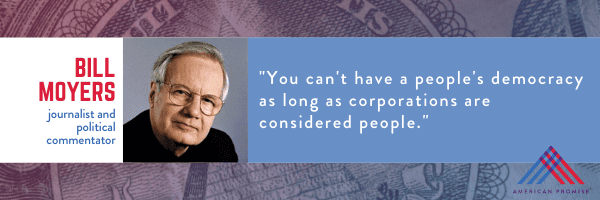There are several election reforms at the core of the nascent democracy movement growing in the United States, and the prospect that we need to pass Constitutional amendments to fix some of the structural issues is gaining traction.
American Promise has been hosting Writing the 28th Amendment Town Halls across the nation to engage communities in conversation about which issues require an amendment to fix, and to see which proposals have broad-based support. These town halls and our online polling have shown that an amendment to address big money in politics has the broadest cross-partisan consensus—and this is the core reform American Promise is working to advance.
However, we continue to gather Americans’ input and feedback on the main focus of our work, and on other democracy reforms that have been proposed. Below we discuss a variety of proposed amendment provisions that have been advanced by democracy reform groups.
After reading through the options, you can weigh in on which are most important to you in our online poll.
Big Money in Politics
Due to a series of disastrous Supreme Court decisions such as Citizens United v. FEC and Buckley v. Valeo, the U.S. campaign finance system is dominated by donations from the ultra-wealthy. Many groups, including American Promise, are working to advance an amendment that allows Congress and the states to establish common-sense campaign finance limits. Wealthy individuals and corporations can currently spend as much as they want through Super PACs to influence our elections, and it would be unConstitutional for Congress or states to try to put limits on Super PAC spending without an amendment. In the 2014 elections, .01% of donors accounted for 29% of all disclosed political expenditures.
75 percent of all Americans, and a majority of people across the political spectrum, support a Constitutional amendment to get big money out of politics. This cross-partisan, grassroots support has led Democrats and Republicans in 20 states—more than half the 38 needed to ratify—to pass resolutions calling on Congress to pass the amendment. Additionally, one 28th Amendment proposal regarding money in politics was introduced in the House of Representatives with bipartisan support and the Senate. Between the chambers of Congress there are a total of 180 co-sponsors.
Corporate Rights/Personhood
Often tied with amendment proposals related to big money in politics are provisions aimed at allowing Congress and the states to distinguish between corporations or other artificial entities and people. As a result of the Citizens United Supreme Court decision, corporations, big unions and special interest groups are allowed to spend unlimited amounts of money supporting or opposing candidates for elected office on the grounds that limiting these expenditures violates a corporation’s First Amendment rights. These groups use Super PACs to pool money and amplify their political agenda with millions of dollars.
The Court has also granted corporations and other artificial entities other rights originally meant for humans, such as 14th Amendment equal protection. Granting these rights to corporations essentially indicates that the Court considers corporations to be legally equivalent to people, and only an amendment can correct that mistake.

Partisan Gerrymandering
The practice of partisan gerrymandering has been leveraged by both of the major parties across the nation. Gerrymandering occurs when the majority party in a state draws districts that are favorable to maximize the number of seats that party will win in upcoming elections. Essentially, elected officials in the majority get to pick their voters through this practice.

In June, the Supreme Court said the issue of partisan gerrymandering is a non-justiciable political question, which bars any judicial action to intervene in the practice. Though Congress and states could still pass laws banning this practice, the Court’s ruling set off an amplification of calls for a Constitutional amendment to outlaw the practice of partisan gerrymandering.
Congressional Term Limits
Many Americans believe entrenched figures in Washington hinder progress and contribute to gridlock on Capitol Hill. Term limits for Congress are one method that has been proposed to infuse new voices and, ideally, greater productivity into the political process. We passed the 22nd Amendment to set term limits for the President, and establishing term limits for Congress would similarly require a Constitutional amendment.
In Congress, Senators can serve an unlimited number of six-year terms and Representatives can serve an unlimited number of two-year terms. The name recognition of members of Congress and the ability to tap into established networks of donors greatly contribute to incumbency. Recent polling has shown Congress has less than a 20 percent approval rating, but nearly all members of Congress are re-elected year after year. A strong cross-partisan majority of Americans support a Constitutional amendment to enact Congressional term limits, and several amendment proposals are introduced every year.
Right to Vote
While it may seem paradoxical given the importance voting rights have played throughout American history, the U.S. Constitution does not explicitly grant citizens a right to vote. The amendments that do relate to voting rights—the 15th, 19th, 24th and 26th—prohibit voting discrimination based on race, sex and age for citizens 18 and older, and outlaw the use of poll taxes. Voting rights advocates argue that establishing a Constitutional right to vote will ensure politicians cannot enact discriminatory voting laws not prohibited by these amendments. Further, these advocates believe the amendment will lay the foundation for legislation that strengthens democratic participation.
National Popular Vote
In two of the last five presidential elections, the general election winner lost the popular vote but won the electoral college. These election outcomes, as well as the political apathy of people in the minority party in deep blue and deep red states whose votes are essentially nullified, have contributed to the growing movement to abolish the electoral college through a Constitutional amendment. The National Popular Vote Interstate Compact is a creative way to essentially bypass the Electoral College, though some have raised concerns about the Constitutionality and stability of such a compact, and argue that an amendment is the safer and more secure path.
Public Financing/Tax Vouchers
Another proposal aimed at limiting big money’s influence in elections has been to establish public funding or a voucher program to fund elections via a Constitutional amendment. These proposals vary in their execution, but each aims at making private donations less important in elections than public financing. Seattle is one city that has enacted a voucher program.

No one argues that public financing of elections can only be achieved via a Constitutional amendment, like is true of limits on Super PAC spending or addressing corporate rights. Rather, advocates point to the permanence of the solution if achieved by amendment.
Honorable Mention: Ranked Choice Voting
Across the nation, the state of Maine and several cities have implemented an exciting election reform called ranked choice voting. By asking voters to rank candidates in order of preference, and performing essentially a series of instant runoffs, RCV has the potential to eliminate the “spoiler effect,” the effect of dividing votes among candidates with similar viewpoints, and make independent candidates viable. While ranked choice voting is becoming more well-known and popular as a democracy reform, there have not been widespread calls to implement ranked choice voting via a federal Constitutional amendment; similar to public financing above, ranked choice voting does not require an amendment to enact, and most progress has been made via citizen ballot initiative campaigns. Because our poll focuses on what has been proposed for inclusion in federal Constitutional amendments, we have not included it as an option in our online poll.
Which of these democracy reforms is most important to you? Share your opinion in our online poll.






